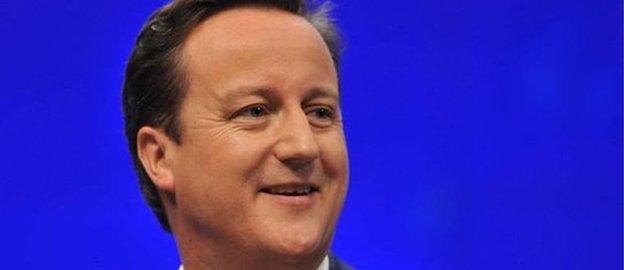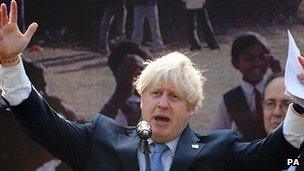Politics in 2012: Party revolts and Budget mess tops Cameron's difficult year
- Published

In Conservative Central Office, a large clock counts down to the next general election.
Every party member yearns for a majority.
David Cameron knows it and in 2012 he has taken time to shape a new message. The "Broken Britain" slogan has gone, replaced by talk of Britain rising again.
"Britain," he told the Conservative Party conference in October, was "still the greatest country on earth". But this optimism cannot hide that 2012 has been at best a very difficult year for the prime minister.
The competence of his government has routinely come under attack, for presiding over a return to recession, and a budget which unravelled over the course of several, embarrassing weeks.
His former spokesman, MP George Eustice, who this year joined the executive of the backbench 1922 committee, said Mr Cameron had had a "very bumpy year".
"He had a peak early on, around about February, when he had his trip to the United States, which went very well. Things went pear-shaped after that."
In March, Mr Cameron's close advisor, Steve Hilton, went to work in the US.
Later in the month, he was caught up in a newspaper sting. A Tory party treasurer had boasted that donors could buy dinner with him at Downing Street, in exchange for influence on policy. No 10 dismissed the claims as "wrong".
Tory councillors fared terribly in local elections in the spring.
Then came the publication of texts by the Leveson Inquiry, revealing the closeness of the prime minister to the former Sun editor, Rebekah Brooks. The texts were signed off with expressions of love - "LOL" - or should that be laughter?
Lords rebellion
On top of all Mr Cameron's external problems, came an increasingly unruly parliamentary party.
In July, Jesse Norman marshalled 91 Tory MPs into the No lobby, to vote against the government's plans for House of Lords reform.
He said he remained a Cameron loyalist, but one, like many others in this Parliament, with an independent mind.
"I don't think they were happy with what we were doing, but I think they respected it and I think they understood it. It was only with the greatest reluctance that we found ourselves having to go the wrong way on that vote."
The difficult year for Mr Cameron and his party has left the Conservatives consistently lagging behind Labour in the polls - quite a change from this time last year.
'A bit tarnished'
But the pollster, Peter Kellner, says the prime minister just about remained an electoral asset.
"There is nobody else that our YouGov data throws up in the Conservative Party that says anybody would do any better than him.
"Whenever we ask about it, David Cameron still comes out ahead. He's a bit tarnished, but he's not yet a liability."
With the clock ticking down on his first term as prime minister, some argue he needs a clearer vision for the country to improve his chances of getting a second.
He used to say that the Big Society was his mission in politics - a term now rarely heard. But Jesse Norman, who helped shape the thinking behind the Big Society idea, believes the vision is still there, only not in name.
"The government has stopped, or is talking less about, the Big Society for a very simple reason. It came to the view that it was a phrase that no one liked and a concept everyone believed in.
"What you needed was a period of time in which people could see that the Big Society wasn't just a name for some programmes in the Cabinet Office to do with philanthropy and volunteering, but was a way of thinking about the whole arc of government."
Mr Cameron has many challenges ahead in 2013. A sizeable chunk of his party will be angered if he presses ahead with his plans for gay marriage.
He will be tested when a raft of spending cuts take effect - such as withdrawing child benefit from high earners and capping the total amount people can claim in benefits.
Rival emerges

Boris Johnson's electoral success has not gone unnoticed among Conservative MPs
Mr Cameron has endured a year of worst-case-scenarios on the economy.
His pre-election pledge to balance the books by the end of this Parliament has been shot to pieces; the government's debt target has been missed and this is now the slowest recovery from a recession since the war.
He says Britain's economy is on the right track, but that remains to be seen.
And then there's Europe.
He will be pressed repeatedly on his commitment to some kind of referendum on the UK's membership of the EU.
"What I think he needs to do is to start to map out a longer-term British vision for an alternative European Union," says George Eustice, who represents the mainstream eurosceptic view within the parliamentary party.
"He's got to articulate the case for a much more flexible and adaptable Europe, that gives up powers as well as adopts powers."
David Cameron acquired a rival this year, the London Mayor, Boris Johnson, who mopped up the limelight and showed Conservatives could win at the ballot box.
Privately there are Conservative MPs who doubt Mr Cameron can. They are fed up of coalition and want him to be more Tory.
For many, his stand on Europe next year will be the measure of that.